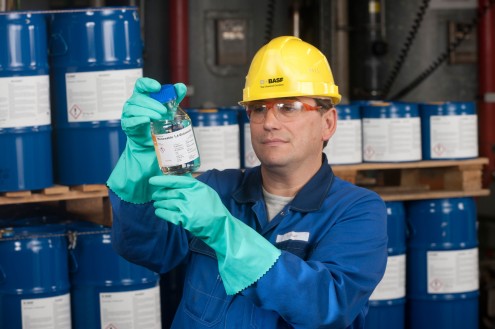 BASF has produced its first commercial volumes of 1,4-butanediol (BDO) from renewable raw material, and is offering this product to customers for testing and commercial use. The production process relies on a patented fermentation technology from Genomatica. The fermentation process uses dextrose as a renewable feedstock.
BASF has produced its first commercial volumes of 1,4-butanediol (BDO) from renewable raw material, and is offering this product to customers for testing and commercial use. The production process relies on a patented fermentation technology from Genomatica. The fermentation process uses dextrose as a renewable feedstock.
According to BASF, the quality of BDO based on renewable raw material is comparable to petrochemical-based BDO. BASF plans to expand its portfolio with selected BDO derivatives based on renewable feedstock, including Polytetrahydrofuran (PolyTHF®). BDO and its derivatives are used for producing plastics, solvents, electronic chemicals and elastic fibers for the packaging, automotive, textile, and sports and leisure industries, among others.
The starting materials for the production of conventional BDO are natural gas, butane, butadiene and propylene. BASF currently produces BDO and BDO equivalents at its sites in Ludwigshafen, Germany; Geismar, Louisiana; Chiba, Japan; Kuantan, Malaysia; and Caojing, China. In July BASF announced to increase its global capacities for BDO to 650,000 metric tons and for PolyTHF to 350,000 metric tons within the coming two years.
Now, after cutting and pasting the press release, the question here is if BASF will charge its bio-BDO and associated derivatives with a premium for the “bio” aspect of the materials or will these bio-BDO and derivatives will disappear in the overall BDO pool (meaning no premium attached). Some renewable chemical companies believe that most bio-based commodity chemicals, once sufficient volume is commercialized, will just be absorbed in the general chemical supply chain. This is what happened to bio-epichlorohydrin and fatty alcohols.
However, I think it will make sense for BASF to charge premiums for the bio-BDO. I imagine the company has to pay licensing fees to Genomatica if BASF starts commercial production. It also has to invest in fermentation equipments to produce commercial volumes of bio-BDO. The blog does wonder where BASF is currently producing the bio-BDO materials? Also, if BASF wants to produce derivatives of bio-BDO and those will be marketed separately as “bio”, the blog assumes more equipment investments and strict quality control at the company’s current BDO sites, to separate those bio-BDO derivatives production from petro-based materials.
According to Tecnon Orbichem, the current global market for BDO is around 2 million tons/years and relatively little BDO is sold in the merchant markets as most is consumed as intermediate. THF is the largest end use followed by PBT resins. There are petro-based BDO capacities expected to come onstream in the next two years in China, including that of BASF’s. Demand in China is currently considered weak.





One response to “BASF produces first bio-BDO commercial volumes”
[…] BASF produces first bio-BDO commercial volumes (greenchemicalsblog.com) […]